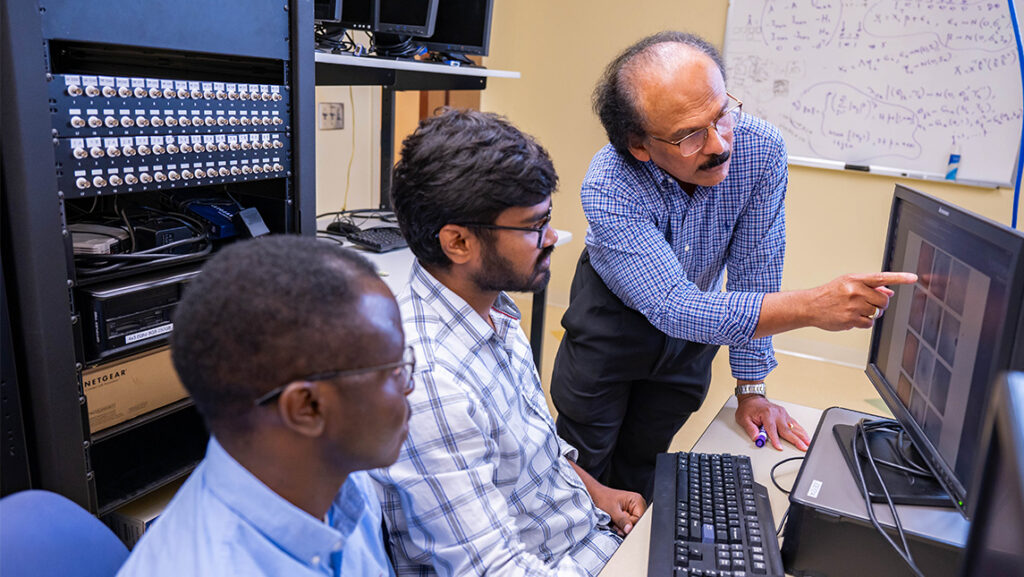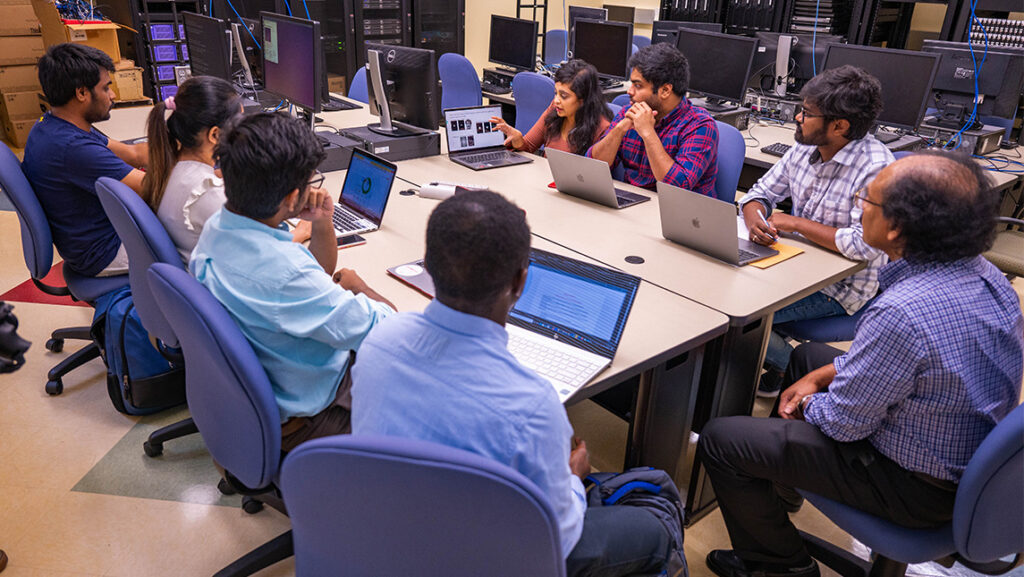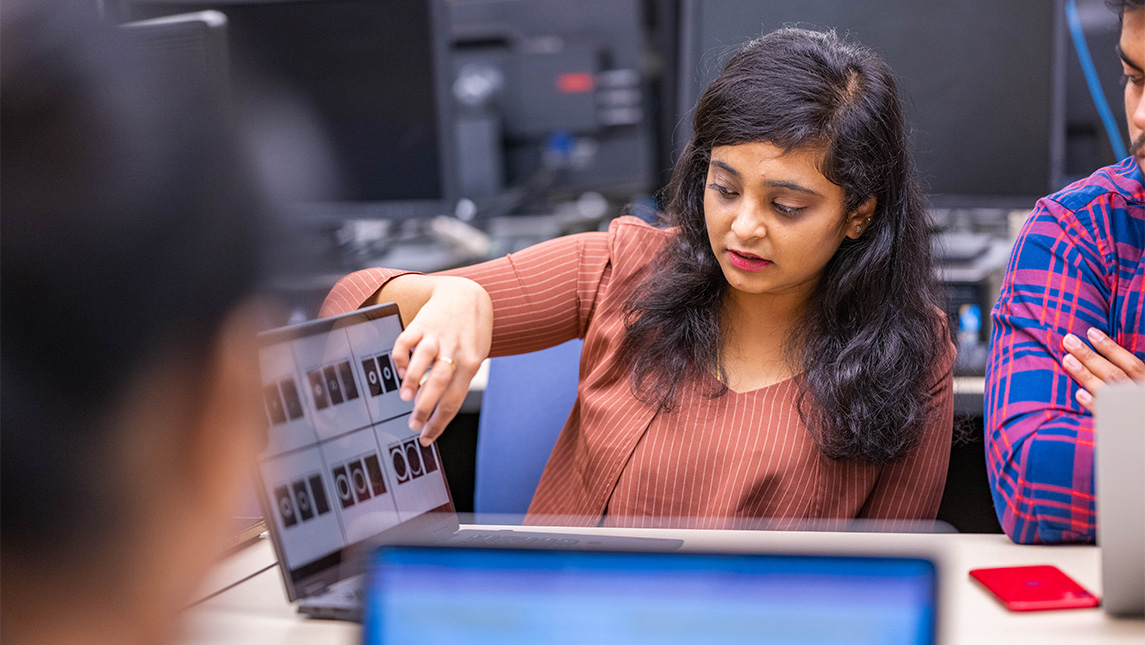Artificial intelligence (AI) has found its way into day-to-day aspects of our lives. UNC Greensboro’s faculty want students to be prepared to work with these tools.
As AI becomes more widely used, the demand for workers with AI-related skills is increasing at an incredible rate. More companies may soon require employees to work with AI. Dr. Hamid Nemati, professor of information systems, says businesses are waking up to the potential of AI but don’t necessarily know what they want. That influences the skills they’ll look for in new hires.
“According to the Bureau of Labor statistics, eight of the top 20 fastest-growing occupations between 2021 and 2031 are IT and/or data-related,” says Nemati. “But for most of these occupations, the most important skill is not a computer skill or an AI skill. It’s communication skills, thinking, and problem-solving.”
It’s up to UNCG professors such as Nemati at the Bryan School of Business and Economics and his colleagues in the computer science program in the College of Arts and Sciences to teach students not only how to communicate with AI, but to turn it into a beneficial tool for any job.
Laying the foundation
Artificial intelligence emerged around 1958, with the innovative work of Cornell Professor Frank Rosenblatt on neural networks. Dr. Shan Suthaharan, director of UNCG’s computer science graduate program and a key researcher in big data and machine learning, says development largely had to wait until techniques, technology, and flexibility with humans had advanced further.
He addresses a question that concerns many people: whether AI will replace human workers.
“We need to use AI to help and enhance our human capabilities,” he says. “We need to know how to use it productively, so that we can have a better life.”
To teach students how to work with AI, he also teaches them how humans process information. They learn about “neuro-fuzzy logic,” a process that combines two human capabilities – approximate reasoning and complex pattern recognition.
“We are basically training the computing devices to come closer to the way that humans think,” he explains.
Chunjiang Zhu, assistant professor of computer science, teaches foundational courses on AI at UNCG, including Foundation of Computer Science II. “That has some logic components,” he says. “We have an assignment to convert any English sentence of your interest into a logic format – If A then B.”
He works with students on commonly used AI systems and techniques. They spend time talking with conversational AI, which is similar to the recently unveiled and highly publicized ChatGPT but more robotic in nature.
“Conversational AI teaches students the important modules, like speech to text,” says Zhu. “How can we convert audio inputs into a sentence? Then how can we convert the sentence into a syntactic structure? Then, how can we understand the meaning of the sentence?”
From theory to the workplace
Other conversations about AI are happening in the Department of Information Systems and Supply Chain Management at UNCG’s Bryan School.
The number of students registering for Nemati’s AI courses has increased. “Typically, my undergraduate class has about 40 students,” he says. “Last semester’s master of science in IT (MS in IT) course had 57, which is a huge class for the graduate level. The master of business administration course had about 40 students.”
Nemati’s classes provide students with AI skills needed to support employers’ needs and expectations. The MS in IT students look at how to account for biases and mistakes in data collections. “Data used to be just numbers; now it’s textual,” says Nemati, “And it may contain misrepresentatives, misspellings, and erroneous data.”
In another exercise for his postdoctoral students, Verizon shared their data on defective cellphones returned by customers. The students used that to study an AI that could suggest which phones might be fixed and which should be thrown away.
Some of UNCG’s students have experimented with ChatGPT in other areas of study. Assistant Professor Rachel Mills, research and Capstone coordinator of genetic counseling, says they had at least one student ask it to help her draft a paper.
“She still had to go back and do some significant edits to make sure it was written in her voice, double-check the data, and make sure the information was up to date,” says Mills.
She says professionals see current AI as tools to collect research and personalize educational materials for patients. This saves them time and eases their workload per case. “They might ask it to write a paragraph on hereditary breast cancer at a fifth grade reading level,” she says. “It’s a form of resource utilization management.”
Genetic counselors still have concerns about AI, says Mills. The first is potential misinformation if an AI cites an outdated or fictional study. Their second concern is privacy related to uploading information onto a third-party program with open-source software that can be viewed by the public. In May 2023, Samsung banned the use of certain AI after an employee uploaded privileged material into ChatGPT.
“There have been cautions about using AI to create patient letters or resources,” says Mills. “They need to make sure they’re refraining to put in identifying information or specific medical history. Anything more than generalized resources.”
Finger on the pulse of AI evolution
The professors closely watch how AI could evolve further. Suthaharan has research on “Explainable AI” that will be published in August.
“That means you can ask the AI to explain why it’s doing something, and the AI learns further from the experience,” he says.


Zhu agrees that an AI that can “explain itself” will be critical to its usefulness in industries such as banking and medicine. “AI can achieve impressive prediction performance in these fields, but it often lacks the ability to provide explanations for its decisions.”
Whatever AI does in the future, Suthaharan says businesses will be concerned with how it can serve their company goals: productivity, quality, safety, privacy and security, and the ability to learn and adapt from experience.
He predicts the development of future AI will be exponential. “I’m not sure what tomorrow’s workplace will be, but today’s is basically defined as a data-driven, collaborative workplace.”
Nemati says today’s students in all fields should be prepared to work with AI. “Expect to see AI or AI-enabled applications become more widespread. Your chemistry major, sociology major, or psychology major should include AI competencies. Your job will depend on it.”
Story by Janet Imrick, University Communications
Photography by David Lee Row, University Communications
Additional photography courtesy of Adobe Stock

Discover the tools for your success



